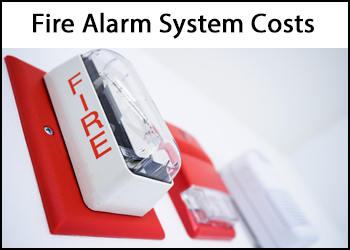How Much Does a Fire Alarm System Cost?
Last Updated: January 07, 2022

Fact Checked By: Ryan Maguire
On This Page
CostOwl.com note: Need an alarm system at an affordable price? Fill out the 30 second questionnaire below and our alarm system partners will send you free price quotes.
Quick Summary: Fire Alarm Cost Per Sq Foot #
A fire alarm system will cost between $2 and $6 per square foot depending on size and complexity of the system. Monitoring costs extra and costs $50 to $100 per month.

Every business needs a professionally installed fire alarm system. It's not just a good safety practice; it's the law. Local building codes and federal occupational safety standards require compliance with fire alarm system regulations.
Commercial fire alarm systems are triggered by smoke, rapid changes in temperature, or flames. When a smoke or heat detector is activated it triggers a central monitoring system that sounds an alarm throughout the building to warn employees. Simultaneously, it notifies the fire department. In many cases, central monitoring systems are also connected to sprinkler systems that contain the fire.
Fire Alarm System Average Costs #
The cost of your system will depend on the size of your building, local building codes, and the complexity of installation. Generally, fire alarm systems are more expensive to install in older buildings than with new construction.
There are three basic types of fees that come with a commercial fire alarm system: the equipment, monitoring fees and miscellaneous costs.
- Fire alarm equipment is usually priced at $2 to $3 per square foot for a basic system that includes smoke and heat detectors and alarms that have both visual and audio alerts. For more complex systems in large buildings, the price goes up to $4 to $6 per square foot. Adding a sprinkler system increases the price by anywhere from $3 to $12 per square foot, not including installation.
- Monitoring fees tend to run $50 to $100 per month. This usually includes an annual inspection to make sure the alarm system is functioning properly. Usually, you will be required to sign at least a three year contract.
- Miscellaneous fees include extended warranties, which take effects after the initial warranty has expired. Budget about 10% of the total project cost on an annual basis. Some cities and towns require permits before an alarm system can be installed, and those permits often come with small fees.
It doesn't matter if you are installing a brand new fire alarm system or simply upgrading an existing one, it is important to be aware of and understand the different types of commercial fire alarm systems that are available. Each system works differently, and knowing the ins and outs of each one helps you understand the right choice for your building.
Categories of Alarm Systems #
There are two main categories of fire alarm systems: automatic and manual. Automatic fire alarms are designed to send an audio-visual signal (such as a siren and strobe light) when they detect heat or smoke. Manual fire alarms, on the other hand, have pull stations set up around the building that can be pulled whenever someone sees or smells a fire.
Types of Fire Alarm Systems #
With several types of commercial fire alarm systems available, it is important to know the features and differences between each one. Once you fully understand all of the available options, you can make the best possible decision for your building. System types include:
Analogue-addressable fire alarm systems: Also known as intelligent alarm systems, these fire alarms provide details on individual detectors and are designed specifically for large commercial premises and complex network systems. Analogue-addressable systems have higher intelligence, scope of control, and speed of identification. They require less cabling than more conventional systems and each call point or detector has a unique address, meaning that the fire control panel receives information from each individual device. These systems tend to be more expensive than others.
Aspirating smoke detection systems: Though aspirating systems are technically detection systems, they are incredibly sensitive and have the ability to detect even the smallest of fires faster than other systems. They utilize a fan and network of sampling holes and pipes to draw in air from around the building. The air is analyzed as it passes through a sensitive precision detector and if smoke particles are detected a warning signal is generated.
Conventional fire alarm systems: These fire alarm systems are commonly found in smaller properties and are less expensive than other alarm systems. Often referred to as four-wire systems, conventional fire alarms divide a building into detection zones that have call points and detectors hardwired to the control panel. Unlike analogue-addressable systems, where each detector has a unique address, a conventional system can have multiple detectors in a single zone. When a detector is activated, the control panel indicates the zone that the alarm originated from, but the zone has to be searched in order to find the specific device that was set off.
Hybrid fire alarm systems: A combination of the addressable loops of analogue-addressable systems and the hardwired zone features of conventional systems, hybrid fire alarm systems often fit settings better than either analogue-addressable or conventional systems.
Two-wire fire alarms systems: These systems are based on conventional alarm system technology and also designed for smaller operations. They cost more than conventional four-wire systems, but the installation cost is low and they have a faster response time and more flexibility.
Wireless fire alarm systems: This system may cost more than others, but it offers more flexibility and provides the same level of protection. It is extremely useful in buildings where wired systems are either unsuitable or not possible. Plus, with no cables, there is no need for long-term cable testing.
Components of a Fire Alarm System #
There are several components that go into a fire alarm system, each one integral to its overall performance.
- Control panels: This is the brain of the entire system; it constantly monitors the detectors installed throughout a building. Fire control panels can perform a range of activities whenever fire conditions are detected, such as closing fire and smoke doors, initiating fire and smoke handling operations, and sounding evacuation and fire alarms.
- Initiation devices: Pull stations, sensor-activated detectors, and waterflow monitors are all devices that activate fire alarm conditions. Some systems require manual activation, while others have automatic elements that trigger the alarm. Whatever the setup, initiation devices are an incredibly important aspect of all fire alarm systems.
- Notification equipment: This includes audible and visual alerts, such as flashing lights, sirens, and voice instructions detailing exit plans.
There are also additional accessories and features available for fire alarm systems that may be useful or necessary depending on the age and type of building. Gas and smoke detection options are available with some systems, with the ability to detect either in the building and/or throughout the ducts. Emergency door holding features that immediately release all fire doors are also an option, as well as emergency elevator recall systems that bring elevators directly to the ground floor and prevent them from opening on any floors where fire is detected.
What Is The Lifespan Of A Fire Alarm System? #
The typical lifespan of a fire alarm system is 12 to 15 years, provided regular inspections, maintenance, and testing are performed. This lifespan is also depends on proper design and installation of the system. If your system is not installed properly and checked regularly, it may require a replacement or upgrade more frequently.
When Should I Upgrade My Fire Alarm System? #
Your fire alarm system may be properly installed and receive all the regular maintenance checks and inspections. But that does not mean that your system isn't outdated or in need of an upgrade. It is difficult to know when it is time to upgrade, but there are some key signs to look for that will show you it's time for a new system.
The age of the fire alarm is one of the first things to look at. Fire alarm systems can operate successfully for as long as fifteen years, but the latest you should start taking a serious look at its performance is ten years. An older system does not have the same features of a newer one, which will almost definitely be more advanced, if not safer. Beyond this, the older a fire alarm system is the harder it is to get components for repairs.
If you find yourself constantly having to perform maintenance or repairs then it is probably time for an upgrade. An upgraded alarm system does away with the headache of having the alarm repaired or worked on all the time and saves you money in the long run. Similarly, if your building has had any additions or renovations done, your current system might not cut it anymore. Renovations can also mean your fire alarm system is no longer compliant with local building, fire, or safety codes.
What Can Affect the Lifespan of A Fire Alarm? #
There are several factors that affect the lifespan of a fire alarm system. The application of the system, climate it is located in, and the usage of the system all impact how the alarm functions. For example, if the fire alarm system is located in a remote building that is prone to main or power failures, the battery is likely to be drained on a regular basis, decreasing the overall lifespan and leading to more frequent replacements.
Again, age is a big part of all of this. The older a system is, the more likely these factors are to affect it. Performance in general decreases over time, but an out-of-date system is definitely more likely to experience issues that deteriorate its expected lifespan. However, factors such as this can be avoided or remedied by regular inspections and maintenance.
Maintaining a Fire Alarm System #
The majority of fire alarm system manufacturers recommend, at a minimum, one annual inspection and test after the initial install of the system. Other agencies or local authorities might recommend (or mandate) additional inspection or testing intervals. The National Fire Protection Association (NFPA) details the standards for the application, installation, maintenance, and performance of fire alarm systems under National Fire Alarm Code NFPA 72.
Insurance companies and local authorities also have standards that they set for the maintenance and upkeep of fire alarm systems. These standards may even exceed those set by the NFPA. It is important to note, however, that all alarms systems are different and require different levels of maintenance. It is a good idea to factor in all recommended guidelines from the manufacturer of the alarm, the NFPA, and any local authorities when figuring out your maintenance schedule. A good rule of thumb is to follow the guidelines that recommend more frequent maintenance.
The Importance of Having a Fire Alarm System #
A fire alarm system is absolutely crucial for every commercial building. In addition to letting you know there is a fire in your building, a properly installed and well-maintained fire alarm system provides:
- Activation of suppression systems: Information from your fire alarm system is what activates suppression methods such as fire sprinklers. This can be the difference between a quickly contained fire and the loss of a building or lives.
- Audio and visual alarms: Unlike a simple detection system, audible and visual alarms, such as sirens and strobe lights, alert the people in the building that there is a fire so they can get to safety.
- Compliance: Commercial buildings must be up to the proper codes required by the NFPA and any local authorities. A fire alarm system ensures that you are in compliance with these codes.teachers safe.
Choosing a Fire Alarm System Dealer #
Because fire alarm systems vary so widely in price, it's best to talk to a local dealer about specific pricing information. Shop multiple dealers and ask for a complete list of all the costs - equipment, installation, maintenance and warranties.
Any reputable dealer will want to visit the site before providing you with an exact quote. That's the best way to determine your exact fire protection needs. Make sure any dealer you select is properly licensed. The company should be licensed with local regulatory agencies and the National Institute for Certification of Engineering Technologies.
Sources:
